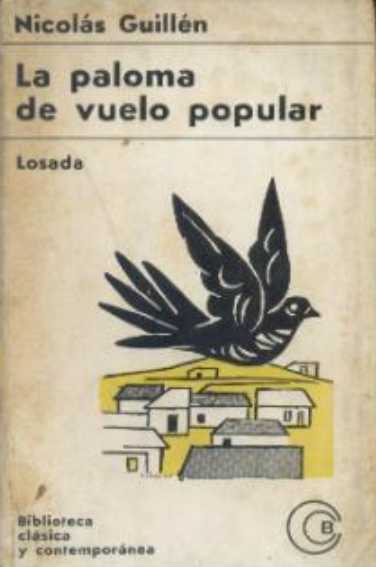4.1.1.14.7 “The popular flying pigeon”, published in 1958 by Nicolás Guillén

Nicolás Guillén’s “The Dove of Popular Flight,” published in Buenos Aires, brings together 39 texts he had written throughout his years as a poet. The title itself alludes to his desire to create, closely aligned with the worldview of the humblest, yet taking flight from it. This combines his ideological and aesthetic attitudes of powerful revolutionary projection.
The text is composed of poems that have become universally recognized not only because of their language and popular themes, but also because the lyrical subject does not remain cloistered within an isolated poetic ego and emerges into the plurality of “we,” a spirit that sustains it throughout a significant portion of his poetic output.
One of the pieces in the collection is “The Wall,” which contains a message of unity, based on racial integration and, in general, a great display of positive and negative symbols. There is also a subliminal level of interpretation that alludes to the ability of the people, the builders of the wall, to choose the alternative to follow, preventing the passage of the “colonel’s saber,” the “poison and the dagger,” all of which allows us to intuit a political undertone. The text presents a cyclical structure that reiterates, with slight variations, the opening stanzas:
“To make this wall,
bring me all your hands:
the blacks, their black hands,
the whites, their white hands.
Oh,
a wall that goes
from the beach to the mountain,
from the mountain to the beach, well,
over the horizon.”
The theme of race is also present in the text, reflecting discrimination and the repressive forces that acted against the people, with certain reminiscences of “Songs for Soldiers.” Exile, love, and death appear as the backdrop for a discourse of proud origins in popular art.
The collection also includes a series of six elegies, which constitute a substantial contribution to this lyrical style rooted in the national tradition, the other side of the so-called Cuban choteo, which converge in the nation’s identity through poetic expression.
Most of these poems, with a polished sentiment untouched by resignation, denounce racial injustice and the underlying imperialist domination that determined the moral status quo, emphasizing the contrast between the beauty of nature and the precariousness of values, a point masterfully highlighted by José María Heredia. Among these is the “Elegy to Jesús Menéndez,” which, due to its significance, will be addressed in a separate section. Overall, the collection constitutes a lyrical tribute to the people, their culture, and their painful hopes.








